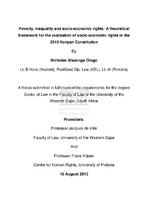| dc.description.abstract | Poverty and inequality are deeply entrenched in Kenya, with the country being one of the mostunequal countries in the world. To eradicate poverty and inequality, enhance the achievement ofsocial justice, fast-track human development, as well as to entrench participatory democracy and a culture of justification in governance, Kenya has, for the first time, entrenched justiciable
socio-economic rights (SERs) in its 2010 Constitution. In this thesis, I undertake a criticalanalysis of the prospects for the implementation and enforcement of the entrenched SERs as well as the probable challenges that Kenya may face in their realisation. In this endeavour, the thesis develops a theoretical and interpretive approach for the realisation of these entrenched
SERs. It entails an expansive analysis of the nature, scope, content and extent of the SERs entrenched in the 2010 Kenyan Constitution, and especially the place of international human rights obligations contained in customs and ratified international human rights treaties due to the provisions of the 2010 Constitution which espouse the direct application of international law in
Kenya’s domestic legal system. It is submitted in this thesis that in order to improve the socio-economic conditions of the poor, vulnerable and marginalised groups in Kenya, there is a need for their socio-economic as well as political empowerment to enable them to effectively take part in societal decision-making in both the public and private spheres with regard to resource (re)distribution. The theory of dialogical constitutionalism, based on the constitutionally entrenched principle of popular participation in governance and public decision-making, is aimed at the realisation of both political and socio-economic empowerment of these groups. Even though the theory of
dialogical constitutionalism underscores the importance of litigation in the achievement of the transformative aspirations of the 2010 Kenyan Constitution contained in the entrenched SERs, it acknowledges that litigation is not the panacea of SER enforcement, and that other political and advocacy strategies play an important role in the emancipation of the socio-economically
deprived groups in society. The thesis thus advocates a multi-pronged strategy which espouses the equal participation of all sectors of society in a collaborative and cooperative deliberative effort aimed at the full realisation of the entrenched SERs. To accompany the above theoretical framework for the interpretation and
implementation of the entrenched SERs, the thesis further proposes a transformative and integrated approach which combines the progressive aspects of the minimum core approach and the reasonableness approach. This is an approach of purposive interpretion which, in the first instance, envisages the courts undertaking a strict and searching scrutiny of the SER
implementation framework developed by the political institutions of the State to ensure that sufficient provision has been made for the basic necessities of the most poor and vulnerable groups in society, basically the espousal of a minimum core content approach. The approach entails the requirement that should the SER implementation framework fail to provide this basic
minimum to vulnerable groups, and the political institutions do not provide a substantive justification as to the failure, then the courts should find the relevant SER implementation framework per se unreasonable and thus invalid. However, should the implementation framework provide sufficiently for the basic essentials for vulnerable groups, the courts should then proceed to review it using the reasonableness standards that have been developed by the
South African Constitutional Court. The rationale for this searching analysis is the
acknowledgement that if the needs and interests of the most indigent and marginalised in society are not catered for, the entire corpus of rights in the Bill of Rights becomes redundant. The thesis then undertakes a case study of two rights, the right to food and the right to housing, using the theoretical and interpretive approaches developed in the previous chapters of the thesis. On food security, the thesis finds that Kenya is a food insecure country with a
declining food production capacity. This is basically due to a lack of subsidy to farmers, global warming leading to intermittent rainfall, lack of investment in sustainable agriculture as well as a fragmented and contradictory legislative and policy agenda. In response to this situation, the thesis proposes the adoption of a livelihoods approach to food security in Kenya, based on the constitutionally entrenched right to food and other supporting rights. This approach advocates
the enhancement of the food entitlements of the different sectors of the Kenyan society to ensure their access to adequate and nutritious food, be it through self-production or through the market. On the right to housing, the thesis finds that housing plays a crucial role in ensuring that people are able to have a holistic, dignified and valuable existence. However, Kenya faces a
dire housing situation, with the majority of Kenyans, both in rural and urban areas lacking adequate shelter and sanitary conditions, evidenced by the large informal settlements in urban areas and the squatter phenomenon in rural areas. With the entrenchment of a justiciable right to adequate housing in the 2010 Constitution, the study finds that several legislative and policy reforms are underway to improve the housing situation, with efforts being made to draft the
Landlord and Tenant Bill 2007, the Housing Bill 2011, the Evictions and resettlement Guidelines and the Evictions and Resettlement Procedures Bill, 2012, among others. The thesis proposes that these legal reforms must be undertaken within an environment of cooperative and collaborative strategic partnership involving all sectors of society so as to ensure that the housing concerns as well as interests of all are catered for. | en_US |

